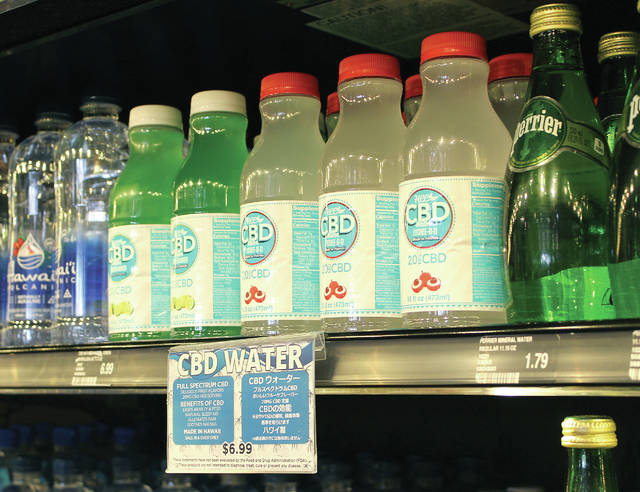State DOH sets record straight about legality of CBD-infused foods

CHELSEA JENSEN/West Hawaii Today Ly-Chee-BD water made by Honolulu-based Hawaii Canabis Care is for sale March 28 at an ABC Store in Kailua Village.
KAILUA-KONA Cannabidiol, a naturally occurring compound in the cannabis plant more commonly known as CBD, is no longer an approved food additive in Hawaii.
KAILUA-KONA — Cannabidiol, a naturally occurring compound in the cannabis plant more commonly known as CBD, is no longer an approved food additive in Hawaii.
In fact, it never was.
ADVERTISING
This appears to be less than common knowledge among the state’s business community considering the proliferation of ingestible CBD products displayed prominently on store shelves throughout the islands.
“Permitted (vendors) are not allowed to serve adulterated foods,” said Bruce Anderson, director of the state Department of Health. “And all foods infused with CBD are considered adulterated, according to our administrative rules.”
The rules haven’t stopped permitted food establishments throughout Hawaii from breaking the law by selling hundreds of different products infused with CBD during recent months and years, from ice cream to gummy candies to lemonade.
But the problem isn’t a corrupt food industry.
It’s that the food industry has no idea what it’s doing is illegal under state statutes.
DOH only recently assumed the mantle of enforcement, and thus far only to a point. It wasn’t until last month that DOH began notifying businesses that their practices were running afoul of the law, which has been done on a case-by-case basis only if someone files a complaint against the establishment in question.
“Since March we’ve been responding to complaints,” said Anderson, adding DOH has not initiated sweeps to check store shelves for illicit CBD products or engaged in mass communication efforts. “We haven’t been monitoring exactly how long establishments have been adding (CBD) to food products here in Hawaii, but it was likely being done before that time.”
DOH adopted the U.S. Food and Drug Administration’s standard model food code for regulatory purposes, Anderson said. The FDA isn’t “telling us what to do,” he continued, but the department does follow the federal lead.
An FDA release issued in December reaffirmed the illegality of advertising CBD products as possessing medicinal benefit, a notion that hasn’t been confirmed by laboratory testing.
“Additionally, it’s unlawful under the (Federal Food, Drug, and Cosmetic) Act to introduce food containing added CBD or THC into interstate commerce, or to market CBD or THC products as, or in, dietary supplements, regardless of whether the substances are hemp-derived,” the release stated.
CBD does not have the same effects as THC, or tetrahydrocannabinol, the chemical responsible for most of marijuana’s psychological effects, and on its own does not produce any type of “high” when used.
Peter Shumar, owner of Hawaiian Licks ice cream shop in Hilo, was notified March 15 of his obligation to remove CBD-infused products from his shelves. He said he’s only aware of a few people on Hawaii Island with licenses to grow hemp, so most ingestible CBD products are being shipped to the state.
“Any (CBD-infused) product coming into Hawaii from other places would be considered adulterated, and they would have the responsibility and authority to stop interstate transport of those products,” Anderson said. “It’s not clear to what extent they’re actually exercising that authority.”
Shumar said DOH officials on Hawaii Island told him out-of-state companies producing edibles labeled as dietary supplements and coming from a state where CBD is currently an approved food additive can ship to Hawaii and sell their products here legally.
Anderson said that is incorrect.
“Let me just say flat out, (CBD) is a prescription drug and therefore it can’t be put into food or sold as a drug without a prescription,” Anderson said. “So if they’ve listed it as a dietary supplement, that would also be illegal and subject to enforcement action.”
He said all businesses DOH has contacted have been cooperative and so far appear to have promptly complied with the mandated removal of illegal products.
But the problem is less compliance than communication, as most businesses still have no idea they’re breaking the law.
Taylor Holt, manager at Island Naturals Market and Deli in Kailua-Kona, said Monday he never heard anything about DOH designating CBD-infused products as illegal and hadn’t been contacted by any DOH personnel. The business sells CBD products labeled as dietary supplements. He wasn’t sure if it offered any similar food products.
A spokesperson for ABC Stores said no one at the company’s Honolulu office was aware of pertinent DOH protocol on CBD food additives as of Monday, adding the state had not contacted ABC Stores. Among its CBD-infused products, the company offers gummies and some beverages.
Other businesses that asked not to be named continue to sell CBD-infused products despite hearing rumors or even being contacted by a DOH official because they’re murky on what is or isn’t actually illegal.
Anderson added that if DOH was aware of any cases in Hawaii characterized by serious health risks caused by CBD consumption that it would pursue much more aggressively shutting down distribution lines of those products.
“CBD is not a benign substance,” Anderson said. “It hasn’t been well studied. That’s one of the reasons we’re concerned. …”
Anderson noted another concern that extends beyond what’s in CBD products to what people taking them might be replacing.
“Essentially, people are taking CBD thinking it’s going to help them and not taking the medicines that may actually be much more (beneficial) to the individuals,” he said. “That’s probably the biggest risk.”
Email Max Dible at mdible@westhawaiitoday.com.


